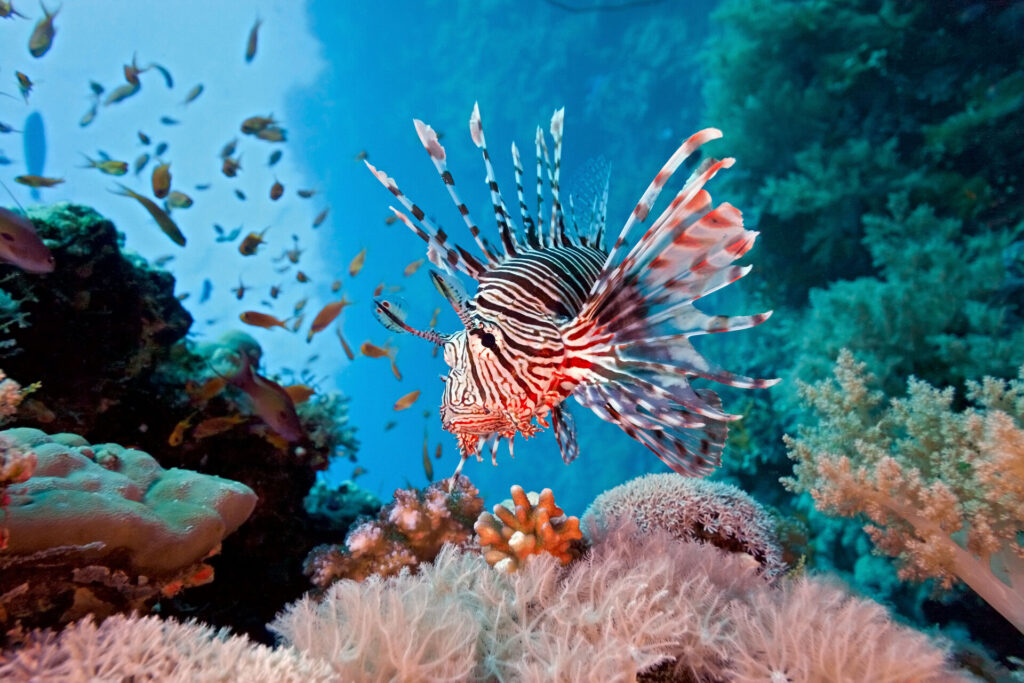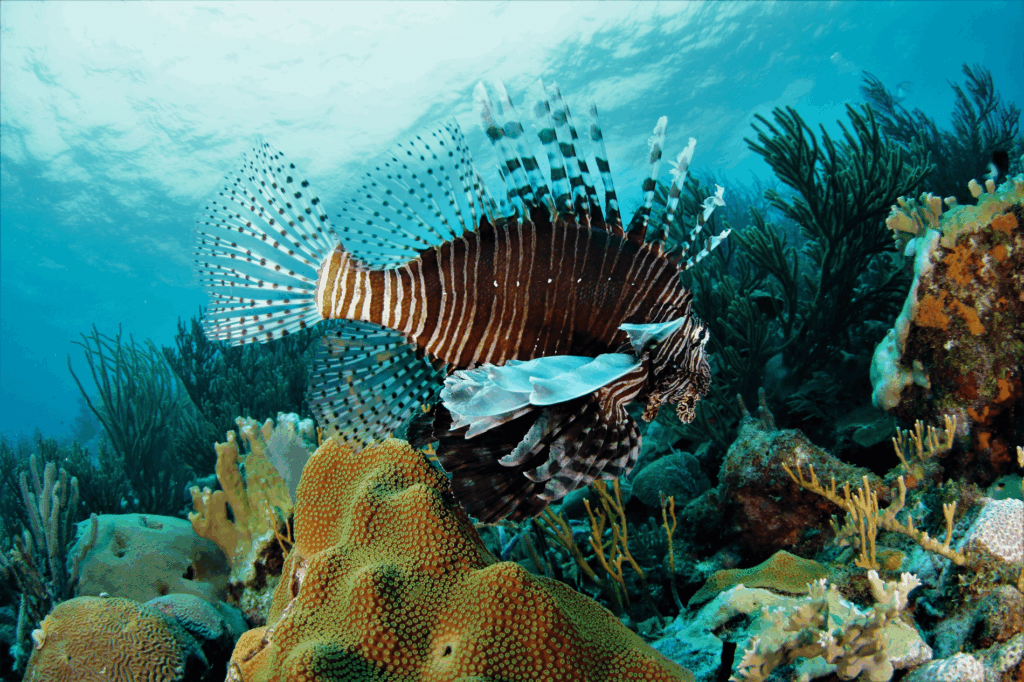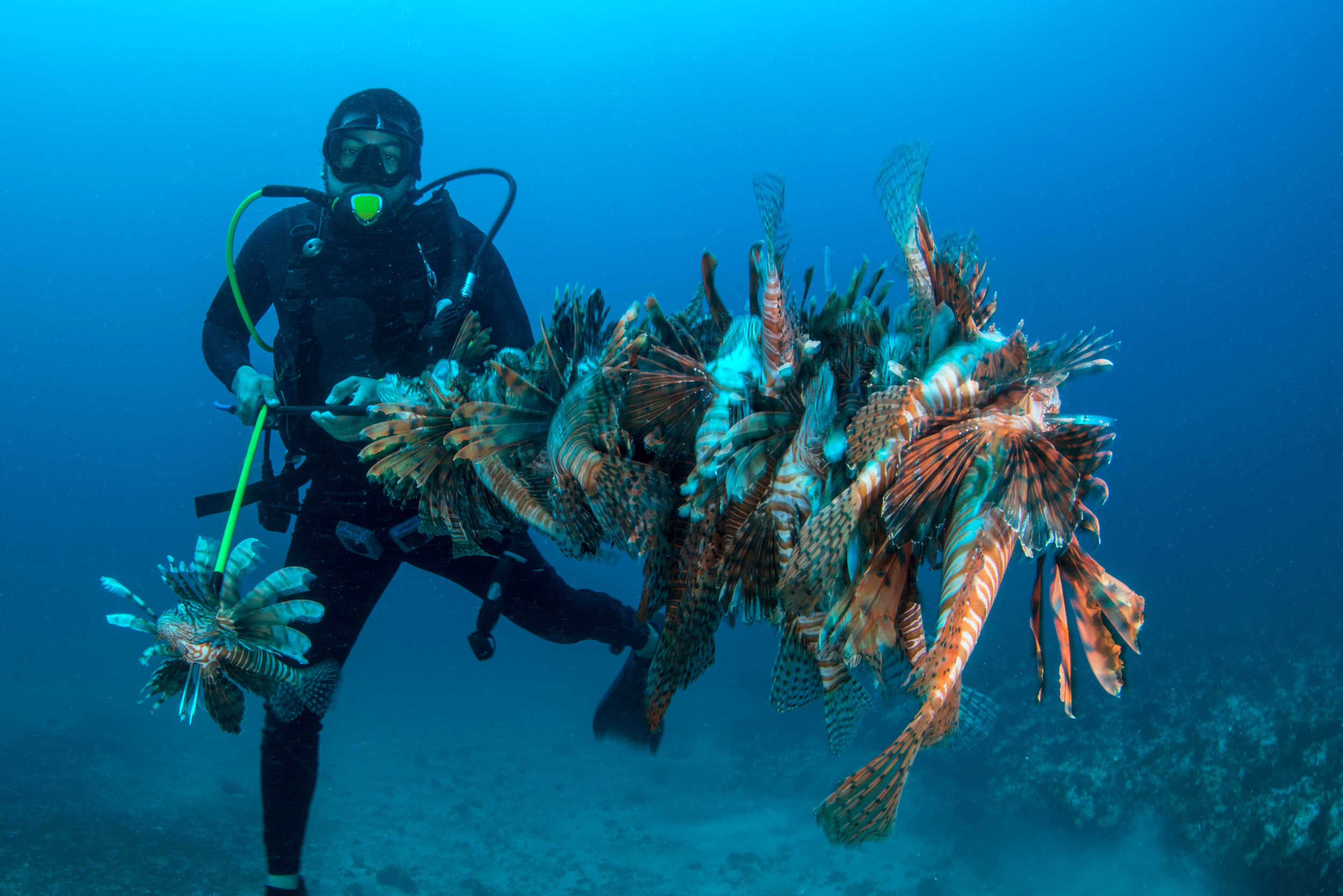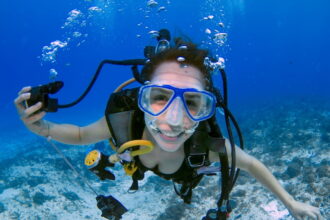Lionfish hunting has become a thrilling adventure and an eco-conscious activity for divers, anglers, and adventurers alike. With their rapid spread in Florida and other tropical waters, lionfish pose a significant threat to local ecosystems. But did you know that hunting lionfish can also be rewarding financially? In this guide, we’ll dive deep into how much it pays to hunt a lionfish, the methods to catch them, the Lionfish Challenge 2025, and 7 surprising benefits you probably didn’t know.
Whether you’re a seasoned diver, a recreational fisher, or just an adventurer seeking a unique experience, this guide covers everything you need to know.
Understanding Lionfish

Table of Contents
What Is a Lionfish?
Lionfish are venomous tropical fish native to the Indo-Pacific region, easily recognizable by their striking stripes and long, spiny fins. While beautiful, their venomous spines make handling them tricky for beginners. Despite this, lionfish are edible and can be safely consumed once properly prepared.
Key facts about lionfish:
- Scientific name: Pterois volitans and Pterois miles
- Average length: 12–15 inches
- Venomous spines: Dorsal, anal, and pelvic fins
- Habitat: Coral reefs, shallow bays, and seagrass beds
Their invasive nature in the Atlantic Ocean, Caribbean, and Florida Keys has made lionfish a significant concern for marine conservationists.
Lionfish in Florida and Beyond
In Florida waters, lionfish populations have exploded over the last decade. Their voracious appetite disrupts local marine ecosystems, preying on native fish and competing for food resources. This is why state programs offer incentives to hunters who actively remove lionfish.
How Much Does a Lionfish Weigh?
On average, lionfish weigh between 1–2 pounds, although larger specimens can reach up to 5 pounds. Weight plays a crucial role in payment rates, as many programs and competitions calculate rewards per pound.
| Size of Lionfish | Average Weight | Notes |
|---|---|---|
| Small | 0.5–1 lb | Typically younger fish |
| Medium | 1–2 lbs | Common in Florida Keys |
| Large | 3–5 lbs | Rare, highly prized |
Knowing the size and weight of your catch can directly influence how much you earn from lionfish hunting.
How Much Does It Pay to Hunt a Lionfish?
Lionfish Payment in Florida
Florida is leading the charge in incentivizing lionfish hunting. Various programs, including the Lionfish Removal Program and Lionfish Challenge 2025, offer cash rewards to divers and fishers who help control this invasive species.
- Average payment: $5–$10 per lionfish, depending on weight and condition
- Additional incentives: Some competitions offer prizes, gift cards, or equipment for high-volume hunters
These incentives not only provide monetary gain but also encourage sustainable fishing practices.
Factors Affecting Payment
Several factors determine the payment rate for lionfish:
- Weight and Size: Larger lionfish are worth more, as they have a bigger ecological impact.
- Seasonal Incentives: During competitions or hot seasons, payouts can increase.
- Market Demand: Culinary and export demand can influence local rates.
- Program Type: State programs versus local competitions often offer different rewards.
Lionfish Price per Pound
The price of lionfish can vary based on location and method of capture:
| Location/Method | Price per Pound | Notes |
|---|---|---|
| Florida Keys Program | $5–$8 | Paid by local authorities |
| Private Market Sale | $8–$12 | Restaurants or fish markets |
| Export | $10–$15 | Rare, international demand |
For divers and fishers, understanding the market ensures that your lionfish hunting efforts are both profitable and sustainable.
Lionfish Hunting Techniques

Lionfish Hunting in Florida Keys
The Florida Keys are a hotspot for lionfish hunting. Divers often use spears or nets during recreational dives, targeting coral reefs and artificial structures.
Tips for hunting in Florida Keys:
- Avoid protected areas and follow local regulations
- Use a lionfish containment device to safely hold fish underwater
- Hunt with a buddy for safety
How to Catch Lionfish with Rod and Reel
For those who prefer fishing from boats or shallow waters, using a rod and reel is effective:
- Use a strong, medium-action rod.
- Apply small live baits such as shrimp or small fish.
- Keep a safe distance from the lionfish’s venomous spines.
- Handle the fish with gloves and proper tools.
This method is particularly popular with recreational fishers and eco-tourism operators.
Diving vs. Rod and Reel Hunting
| Method | Pros | Cons |
|---|---|---|
| Diving | Direct control, eco-friendly, thrilling | Requires skill, safety risk |
| Rod and Reel | Accessible, minimal training needed | Less precise, may stress fish |
Both methods have their place depending on experience, equipment, and target location.
Lionfish Challenge 2025
The Lionfish Challenge 2025 is an annual competition aimed at reducing lionfish populations while rewarding hunters.
- Who can participate: Recreational fishers, divers, and eco-adventurers
- Prizes: Cash, gear, gift cards
- Goals: Encourage safe removal, raise awareness about invasive species, and promote sustainable practices
Participation in events like this combines adventure with environmental impact.
7 Amazing Benefits of Hunting Lionfish
Benefit 1 – Monetary Gain
One of the most obvious advantages is payment per fish or per pound, which can supplement income for recreational fishers and divers.
Benefit 2 – Environmental Conservation
Removing lionfish helps restore balance in local ecosystems by protecting native species and coral reefs.
Benefit 3 – Boosting Local Ecosystems
Lionfish control improves biodiversity, supporting sustainable fisheries and healthier waters.
Benefit 4 – Culinary Opportunities
Lionfish are edible and considered a delicacy. Their mild flavor and firm texture make them popular in restaurants, boosting local culinary tourism.
Benefit 5 – Adventure and Thrill
Lionfish hunting provides an adrenaline rush for divers and fishers, making it a unique recreational activity.
Benefit 6 – Community Engagement
Competitions and group hunts foster a sense of community among divers, anglers, and eco-conscious participants.
Benefit 7 – Skill Development for Divers and Fishers
Handling lionfish safely requires precision, patience, and advanced fishing or diving skills, which improves overall expertise.
Safety Tips and Regulations
Hunting lionfish is exciting but comes with inherent risks due to their venomous spines. Here are some safety guidelines:
- Protective gear: Gloves, puncture-proof containers, and spear-resistant tools
- Legal compliance: Follow Florida Fish and Wildlife Conservation Commission (FWC) rules
- First aid: Know how to treat lionfish stings—soaking in hot water can help neutralize venom
For comprehensive diving and safety tips, check out Skydive Guides for adventure recommendations.
Where to Catch Lionfish
| Location | Notes |
|---|---|
| Florida Keys | Coral reefs, artificial structures |
| South Florida Bays | Shallow waters, reefs |
| Caribbean Waters | High-density lionfish populations |
| Stardew Valley (Gaming Tip) | Fun reference for virtual enthusiasts |
Whether hunting in real waters or exploring virtual adaptations, knowing where to focus your efforts is essential.
FAQ Section (People Also Ask)
Q1: How much does it pay to hunt a lionfish per pound?
A: Typically $5–$10 per pound in Florida programs, with variations depending on competitions and local market demand.
Q2: Is lionfish hunting safe for beginners?
A: Yes, if you follow safety guidelines, wear protective gear, and avoid handling the venomous spines directly.
Q3: Can you eat lionfish?
A: Absolutely. Lionfish are edible and considered a delicacy in many restaurants. Cook thoroughly to enjoy a mild-flavored, firm-textured fish.
Q4: Where can I participate in the Lionfish Challenge 2025?
A: Various events across Florida and Caribbean locations. Check local diving organizations and Scoobadive Guide for updates.
Q5: How to catch lionfish without diving?
A: Use rod and reel techniques, targeting shallow reefs or structures while maintaining a safe distance from the spines.
Key Takeaways
- Lionfish hunting is both profitable and eco-friendly.
- Florida programs and competitions like Lionfish Challenge 2025 provide monetary incentives.
- Understanding lionfish weight, behavior, and habitats increases hunting efficiency.
- Safety is paramount due to venomous spines.
- Hunting lionfish benefits ecosystems, communities, and culinary ventures.
Whether you’re an adventurous diver, a recreational fisher, or someone exploring eco-tourism opportunities, lionfish hunting offers an exciting and rewarding experience. For more diving guides, safety tips, and adventure recommendations, visit Scoobadive Guide




